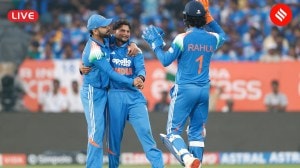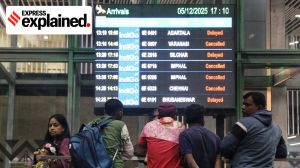‘During talks for ties with Sena, Vajpayee broke down… said it is biased against Dalits’: Former BJP leader Inder Singh Namdhari
Ex-Bihar BJP chief, former Jharkhand Speaker says he left BJP due to "rise in religious frenzy", says Hindutva weak in Bihar as "its politics revolves around caste issues"
 Former BJP leader Inder Singh Namdhari during the release of his autobiography. (Photo: Twitter/@NamdhariInder)
Former BJP leader Inder Singh Namdhari during the release of his autobiography. (Photo: Twitter/@NamdhariInder) Through the course of his political career spanning 47 years, Inder Singh Namdhari has seen many ups and downs. He was a staunch RSS man who started off with the Jan Sangh and later went on to head the BJP in unidivided Bihar. He quit the party in 1990, along with 13 MLAs, to form a group that called itself the Sampoorna Kranti Dal. It later merged with the Janata Dal and eventually became part of the Janata Dal (United). The six-time Daltonganj MLA’s last electoral outing was the 2009 Lok Sabha polls, when he won his only parliamentary election as an Independent from Chatra.
Ahead of the release of his autobiography, Ek Sikh Neta Ki Daastaan, on Wednesday, Namdhari speaks to The Indian Express. Excerpts:
जमशेदपुर में मेरी आत्मकथा”एक सिख नेता की दास्तान”पुस्तक का लोकार्पण राज्यसभा के उप सभापति श्री हरिवंश,विधायक श्री @roysaryu,पूर्व विधायक श्री @KunalSarangi,श्री शैलेंद्र महतो,@Vani_Prakashan ग्रुप के चेयरमैन श्री अरुण माहेश्वरी एवं गणमान्य अतिथियों की उपस्थिति में सम्पन्न हुआ। pic.twitter.com/RWeHTT7PfC
— Inder Singh Namdhari (@NamdhariInder) July 5, 2023
You were part of the Jan Sangh and then the BJP for 22 years. Why did you leave?
There were three reasons behind the decision. First was the rise of temple politics. When the BJP won only two seats in the 1984 (Lok Sabha polls), the party command went into the hands of the more radical Lal Krishna Advaniji. I had asked him about the cost of Ram Mandir politics, arguing how gurdwara politics had harmed Punjab. He said the two issues were separate. But I was not satisfied.
Secondly, there was a riot in Hazaribagh in 1989; 19 people were killed during a Ram Navami procession. As the BJP president, I met Hindus and Muslims. Next day, a BJP MLA said a Muslim League president, referring to me, had gone to meet the families.
Thirdly, BJP leaders of North Bihar started detesting me because I was a staunch supporter of carving out a separate state (Jharkhand, out of the larger Bihar). After the 1990 (Assembly) elections, I was supposed to be chosen as the BJP’s Legislature Party leader, but the hardline BJP leaders did not want me. I was later suspended.
In your book, you mention an incident from 1987 of (former PM) A B Vajpayee sobbing after a heated discussion on an alliance with the Shiv Sena.
There was a fierce debate over the alliance; it was finally accepted after two hours. Vajpayeeji was silent throughout. He was asked to deliver the concluding speech, but he indicated that he was not going to say anything. However, on (the late BJP leader) Pramod Mahajan’s request, he took the mike. He started sobbing. He said: ‘The Shiv Sena discriminates against Dalits so much that a Dalit groom is not allowed to mount the mare. Dalits are not allowed to sit on cots. Maine janeu todkar rajneeti mein pair isliye rakha taaki dharm aur jaat-paat ki bhavnaon se upar uth sakoon (I entered politics after breaking my sacred thread so that I could rise above the feelings of religion and caste)’.
Do you think the BJP’s current politics is different from what Vajpayee advocated? Would the current scenario be different if he had taken a stronger stand?
Yes. The BJP went on to adopt a hardline Hindu nationalist tone after 1984 and also became the political voice of the Ram Janmabhoomi Mandir Movement. In 1989, it won 86 seats.
Do you think people vote for the BJP because of the Hindutva plank or development?
There has been development work here and there. Lekin dharmik unmaad bahut hi nazuk cheez hai (But religious frenzy is a very delicate issue). If people get stuck in it, there could be a rise in fanaticism. It is happening in the country.
Now the Opposition is calling for a caste-based census. Once this data is out, people will be asking for jobs or reservations. Religious frenzy will then get over. Even (Congress leader) Rahul Gandhi is now saying ‘Jiski jitni abaadi uska utna haq (Rights as per one’s population)’.”
You had a relationship with the RSS from 1966. What is your assessment of the RSS now?
People of the Namdhari sect (a Sikh sect) contribute towards cow protection. In 1966, I went to a Gauashtami festival in Daltonganj; a lot of RSS people were there. I saw Jan Sangh’s Deendayal Upadhyaya speaking at an event days later. He was speaking about engaging youth in nation-building activities. I was impressed by his intellect and became inclined towards the Jan Sangh. Those days, the RSS was more about propagating Hinduism. There was not a lot of religious frenzy. Since they got the taste of power, things changed.
Why do you think Hindutva is not a big issue in Bihar?
Bihar politics is centred around social justice. Caste-based inequalities still persist. When Bihar was united, there was a substantial Adivasi population that did not vote for the BJP. The population of backward communities in Bihar is more than, let us say, UP. Religious fundamentalism is dominated by the upper castes.
How was your relationship with Lalu Prasad?
After leaving the BJP following the 1990 Assembly elections (in undivided Bihar), 13 MLAs, including me, came together and called ourself the Sampoorna Kranti Dal. However, Lalu Prasad never wanted to let us exist as a separate group. So, we merged with the Janata Dal. After repeated requests, I became a Cabinet member in 1995 and was given the land and transport departments.
One day, an official told me that Lalu Prasad had called him expressing his insecurity over me conducting camps for land reforms. I also wanted to make some changes in the transport department. I saw the load on Tata trucks was usually more than the prescribed rate and led to losses to the exchequer. I acted on it. However, the problem emerged again. When I enquired, I was told that there were orders not to seize those trucks. There are numerous such instances. After four resignation attempts, I was allowed to resign.
Shibu Soren is largely credited with the formation of Jharkhand.
This is largely incorrect. Shibu Soren and other leaders wanted a larger Jharkhand comprising parts of Bihar, Odisha, West Bengal and Chhattisgarh. That would have never happened. I told Shibu to focus on South Bihar, which was later carved out from Bihar to form Jharkhand.
- 01
- 02
- 03
- 04
- 05































